Chicken Predators: Your Chicken's Worst Nightmare
Keeping your birds safe from chicken predators is very important. We are not the only ones who like chicken.
If you haven't looked at chicken coop designs, chicken predators are a major reason to make sure that your birds are safe and your coop is built solidly.
There are quite a few predators that would love to sink their teeth, claws, or talons into your chickens. We have listed some of the most common predators below to make sure that you know why you need your coop built so sturdy. According to what area you live in, you may have all of these or some of these to worry about.
Dogs
Dogs definitely love to go after chickens. We have five dogs that live with us, and numerous others that come over to visit with friends quite often.

They all react to the chickens differently. Some simply ignore them, some just love to chase, and others really do want to hurt them.
Lola, pictured above, is a chaser. She has never hurt a chicken, but she sure likes to see them run.
Unfortunately we have lost one chicken to a dog that we were watching for people that were out of town. It was surprising because it was the most docile dog that you would ever meet, but like I said, all dogs react to the chickens differently.
Before we knew it, the dog had the bird and it was all over.
I would recommend that you leash all dogs that have never been around birds and try to get them used to them.
We have a lot of dog/chicken experience and have learned the best ways to introduce pets to chickens have them co-exist peacefully. We continue to do real world experimenting as we speak.
When it isn't your dog(s) that are chasing your flock around, that is when it may be the biggest problem. If it is a neighbors dog you have to have that conversation with your neighbor. This can sometimes be unpleasant, but my advice is to try to be neighborly.
Hopefully this can be "nipped in the bud" before a bird is lost. Something like, "Hey, not trying to be a bother, but Buster was in my yard and he was chasing my chickens today. Can you help me out with this before it becomes a problem," will probably work just fine.
I know in my neck of the woods we also have wild dogs that come through from time to time. These should be treated just like the foxes and coyotes that are listed below.
How will I know that it was a dog that killed my chicken?
Domestic dogs usually kill aimlessly, or even accidentally. What you will commonly find is a bird with a broken neck or mauled and nothing is eaten. The bird will usually be left where it was killed out. When the bird stopped struggling the game was over for the dog.
Fox

There is a reason that you hear all of the old phrases about foxes and
hen houses. They are a chicken predator that is good at getting to your
chickens.
Foxes are sly, and will stake out a chicken coop for weeks before making their strike. They are also quite good at what they do.
They can dig like a dog and can climb almost like a cat, getting over fences that you never thought that they could.
When
foxes get in to the coop they usually clean house as well. As the birds
get excited and worked up seeing the fox in the coop, the fox gets
worked up as well.
The result is that every bird the fox can get to will usually be killed. The fox will get as many as he can out of the coop and take them with him.
How will I know that it was a fox that killed my chickens?
The birds will often have: a broken neck, there will be several gone, feathers will be strewn on the ground, you will find feathers away from the coop.
Coyote
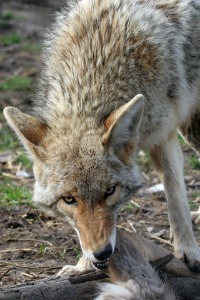
The coyote is more prevalent in our area of Georgia, much more than the fox. The coyote is a chicken predator that will find a way into your coop a lot like the fox, although they are not as big of a climber.
They will more than likely tunnel under the chicken pen
as opposed to going over like a fox does at times. They are still very sly like the fox. They will also stake out a coop and will often wipe it out if they gain access.
How will I know that it was a coyote that killed my chicken?
It may be hard to tell by the evidence if it was a fox or a coyote. How they gained access could be a clue. The coyote will more than likely have tunneled in or forced their way in, while a fox almost never leaves any evidence. The mayhem that ensues will be pretty much the same: birds will be missing, necks broken, feathers scattered.
Raccoon
These masked bandits are sly chicken predators as well, and with the added gift of the opposable thumb, they can be quite the burglar.
They can often figure out latches and door openings. If you know these guys are present in your neighborhood it may be a good idea to put a more complicated latch on your coop door or even go as far as putting a lock on it.
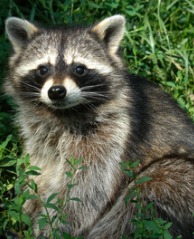
How will I know that it was a raccoon that killed my chicken?
If this burglar gains entry he will normally kill multiple birds. Most of the time you will find their bodies still in the chicken coop because he will have problems carrying them off. He'll usually kill by ripping into their neck.
Raccoon's will rip open the neck and eat at the crop and often go as far as to rip the breast open and eat on it as well. They are also good at stealing eggs.
Opossum
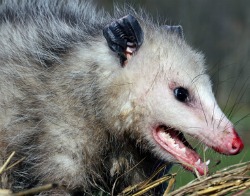
The opossum or as we like to call it just the "possum" can also wreak a little havoc if he can gain access to your coop. This chicken predator is the only marsupial in North America.
He will usually gain access to the coop through any small opening, his goal is to to steal eggs and eat baby chicks. These guys on occasion will also get an adult bird.
How will I know that it was an opossum that killed my chicken?
Most
of the time, as I said, these guys will go for eggs and for your
babies. If they do attack an adult bird they will usually bite at the
neck and then tear at the abdomen.
The dead birds will most
likely be left in the coop because, like the raccoon, they have trouble
getting their spoils out and away from the coop.
Hawk
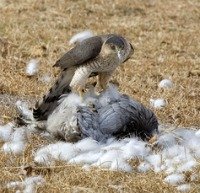
No matter what you have heard hawks do attack and eat chickens. Considering that your chickens don't often look up when searching for danger, the hawks have a pretty high kill ratio, when they do choose to come after your birds.
Like the fox and coyote, they will often stake out opportune times to go after your birds.
They usually do this while birds are free-ranging during the day, as opposed to most of the other chicken predators that attack at night. If hawks are prevalent in your area a good alternative might be to free range your birds in a chicken tractor to give them added chicken predator protection while they graze.
How will I know that it was a hawk that killed my chicken?
A chicken attacked by a hawk will look different than any other predator. Some birds will be missing and the ones that get away will be cut up, almost like they have been stabbed with a knife. The hawks sharp beak and talons can really do some damage.
Owls
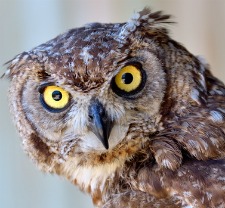
Owls will go after your chickens in a similar way as hawks. They stake out and then swoop in for the kill unexpectedly.
Free range birds are most in danger from the attack of birds of prey, or raptors, such as the hawk and the owl. If you have a problem with raptors attacking your birds it is best to keep them in a chicken coop with a chicken run or in a chicken tractor that can be moved around.
Keep in mind that in the U.S. all hawks and owls are protected under the
Migratory Bird Treaty Act (16 USC, 703-711). What this means is that
protecting your chickens by killing chicken predators such as owls and
hawks around your home place will likely land you with a very steep fine
and possibly some jail time. It is not an option.
How will I know that an Owl killed my chicken?
Hawks
and owls kill in similar ways. If you find a dead bird it will have the
head and neck eaten and will have deep almost surgical looking cuts on
the breast from sharp talons.
How do I know if it is an owl or a
hawk? Good question. Raptor birds often defecate when they make a kill.
Most hawks will leave a sweep of whitewash that you will see making its
way away from the feather pile of the kill. An Owls defecation will also
be a whitewash, but it will be in small heaps and clumpier.
Bears
If you live in an area that has bears you may have to consider them a chicken predator as well. According to how determined they are, there may not be a lot you can do.
Bears can tear into small wood structures such as chicken coops and will get as many chickens as possible. The best way to prevent this will be to build a bear proof chicken coop.
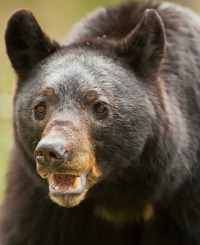
Bears are looking for a quick meal. Raising chickens does not attract bears. Things such as garbage cans that are accessible and especially chicken feed that is accessible. Chicken feed is very high in protein and very attractive to bears. It is almost like crack for bears, they can't get enough of it.
Once they get this close most will then just take the birds they want. The best defense is to not attract them to start with. Make sure that all chicken feed and any garbage is covered and locked to prevent attracting bears.
How will I know that it was a bear that killed my chicken?
It
should be pretty obvious. They are not sly like a fox. They break in
pretty obviously and take what they want. They are also rather heavy, so
you should see the paw print.
Skunks

Skunks are more of an annoyance than a serious chicken predator. They will go after baby chickens and eggs, but rarely attack an adult bird.
They are usually nocturnal and have very poor eyesight. If they gain access to the coop they will go after eggs first. A dog or cat around your home is usually a good deterrent for skunks.
How will I know that a skunk killed my chicken?
You will normally find eggs opened at one end and eaten. If they do get a bird it will have it's neck opened up and the head eaten. Most good coops will keep skunks out.
Fishers (aka Fisher Cats)

These extremely effective chicken predators are rather rare, but still prevalent in the Northeast United States, especially in Massachusetts.
Fisher cats don't fish and really aren't cats at all. They are a member of the Mustelid family that includes weasels, minks, otters and skunks.
They are the biggest animal in this family and excellent climbers.
They view domestic cats and rabbits as prey and often prey on squirrels.
They will raid your chicken coop when given the opportunity. If they gain access they will usually kill multiple birds. These guys are like a cat in the fact that they are quick and excellent climbers.
They can get in a coop in very odd ways from on top of it to small holes in the chicken wire. Fisher cats are very elusive animals and rarely seen.
They do most of their hunting early evening, nighttime and early morning. Fishers are usually attracted by something other than chickens. Make sure that you have your chicken feed properly stored. Chicken feed that is not properly stored will attract small animals that the fishers will be attracted to. Once they are there, they will find every way possible to get to your birds.
How will I know a fisher cat killed my chickens?
Fishers will often kill multiple birds and will try to remove some of them. They will eat the neck and head and probably have the breast of the bird opened up as well.
Fishers can get in small places that other chicken predators can't. How the predator gained access should help you identify if it was a Fisher or not. If you live in the Northeast, you must consider the Fisher as a serious chicken predator.
Other Chicken Predators:
Some other chicken predators include minks, weasels, and different varieties of cats.
Protect Your Flock from Chicken Predators with a Secure Chicken Coop
I've reviewed two quality chicken coop plan resources. I encourage you to click here and discover my findings.
If you're looking for a quality set of chicken coop plans then take a look at my review.
Or just click the image below to access the review...

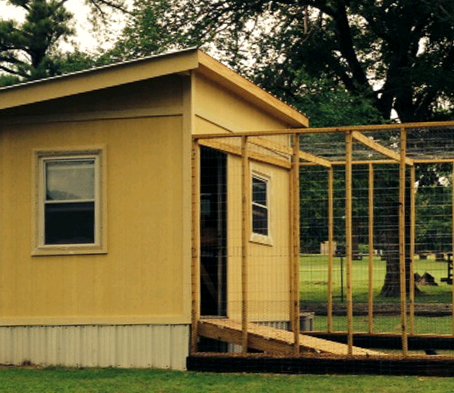
New! Comments
Have your say about what you just read! Leave me a comment in the box below.